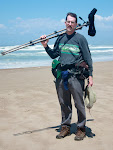
As birders, we initially became interested in birds for a variety of reasons. Some of us started birding because we were already interested in the natural environment. Others began birding and then became interested in the natural environment. Either way, most of us have a strong appreciation of the environment as a whole. Many of us feel a responsibility to be environmentally aware and to act in an environmentally friendly manner. I have summarized several ways birders can act in an environmentally friendly manner:
1)Reduce fuel consumption when birding. Use fuel-free methods of transportation while birding when possible, like walking, biking, canoeing, etc. Public transportation is next best. Carpooling when chasing rarities or going to popular bird spots is not only better environmentally than driving alone, but it may increase your chances of finding birds. Air travel is environmentally the worst form of transportation. List locally – not nationally or internationally.
2) When you do travel, stay in locally owned lodges and hotels. Use local guides or tour groups that use local guides and locally owned lodging and restaurants. Ecotourism can be a great way to support local preservation of habitats and species when the local economy is involved.
3)Support conservation organizations, legislation, and education. Work toward preserving critical habitats, protecting threatened and endangered species, and wildlife rehabilitation. Join, contribute, volunteer, and organize. Buy duck stamps? This certainly helps to preserve habitat for game species, and collaterally for non-game species, but dollars so spent by birders seem to be lumped with those spent by hunters, whose interests are sometimes different than birders.
4)Promote birding and green birding in particular. Lead birding field trips, organize “big sits”, and organize and support bird festivals and other birding events. While we can try to promote green birding activities at these events, birding itself is often a first step for many people toward becoming more environmentally aware.
5)Mentor young birders by taking them individually into the field, organizing field trips for youth, and organizing classes for young birders.
6)Plant bird-friendly native landscaping at your home, and encourage such planting at local schools and parks where possible. (see http://www.allaboutbirds.org/NetCommunity/Page.aspx?pid=1191)
7)Keep dogs confined and cats indoors. This is best for birds and other wildlife, as well as for our pets. Cats, for example, reportedly have an average life expectancy of 12 years if they are indoor cats and only five years if they are outdoor cats due to predators, cat fights, cars, poison, cruelty, and diseases. (See http://www.catworld.com.) Cats kill hundreds of millions of birds annually in the U.S. alone (see http://www.wildbirdfund.com/predation.pdf).
8)Avoid using pesticides, herbicides, and chemical fertilizers. Use compost and other natural fertilizers. Along with organic soil amendments, try “companion planting” (see http://www.companionplanting.net/ ) and encourage and introduce natural predators instead of using pesticides. Harmful chemicals concentrate up the food chain and birds are especially susceptible.
9)Practice good birding ethics which includes generally staying on roadways, trails or other established walkways, not disturbing nesting birds, minimizing other disturbances of birds, etc. (See the ABA Birding Ethics at http://www.aba.org/bigday/ethics.pdf.)
10)Contribute bird sighting data by consistently using "eBird" (see http://ebird.org/content/ebird/ ) for your daily sightings, by participating in bird counts and surveys, keep bird lists for birds you have recorded at local spots which may be used to help preserve or enhance areas in the future.
11)Responsibly feed yard birds. Keep feeders and bird baths clean, don’t stop feeding in the middle of a harsh winter, and use recycled materials for feeders and nest boxes. Growing plants, which birds feed on, is preferable to buying seed trucked from where it is grown. If you buy seed, try buying organic seed. Protect birds at your feeders from cats or other predators as well as from windows. (See http://www.birdwatchersdigest.com/site/backyard_birds/bird_feeding/do_and_dont.aspx
for details on feeding birds in your yard.) Do not feed water birds such as gulls, ducks, geese and pelicans (see http://if-srvv-edis.ifas.ufl.edu/uw193 for an explanation).
12)Try to lead a green lifestyle in general: reduce, reuse, recycle, buy local products (e.g. at farmer’s markets and with Community Supported Agriculture (CSA) subscriptions), buy products from your own country rather than imports,compost and otherwise try to reduce garbage going to landfill, try to buy organic food and certainly avoid the “dirty dozen” produce items (see http://www.msnbc.msn.com/id/13737389/page/2/ ), buy shade-grown organic coffee; carpool and use public transit to work; if you need a car then have a fuel efficient vehicle; buy energy efficient light bulbs and appliances, use rechargeable batteries, avoid over packaged products and bottled water, grow your own vegies and fruit, buy sustainable fish and other seafood (see http://www.montereybayaquarium.org/cr/seafoodwatch.aspx ); use your own reusable or reused bags at the grocery store, reduce consumption of natural gas (use cold water only for washing clothes and set your winter thermostat down) and electricity (hang dry clothes whenever possible and set thermostat on cooler/air conditioner down), conserve water; live near work; reduce or eliminate consumption of beef and lamb or (better yet) be a vegetarian or vegan; buy clothes made from organic cotton or recycled material; pay bills and receive catalogs, newsletters and periodicals electronically; send ecards for birthday, etc., rather than mailing cards; when investing in mutual funds or other retirement funds look for those that are environmentally responsible (the Sierra Club and other environmental organizations endorse particular investment funds), use green building materials,try for solar or wind power installation, etc.





This is very good stuff ... when the GreenBirding/Bigby site is relaunched in the next few months (it's going to happen at lst) can I steal the odd quote?
ReplyDeleteRichard
Montreal
Hi Richard. Use whatever you want from the site. If you can, please refer to this site or provide a link as I would like for more people to see the site and give me feedback.
ReplyDeleteJim
Booking Buddy is the most popular travel search website, you could use to compare travel deals from the top travel booking agencies.
ReplyDelete